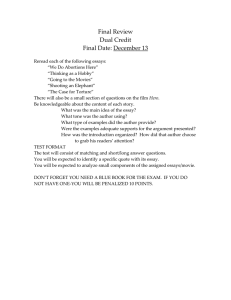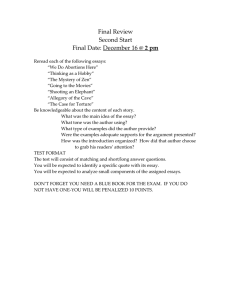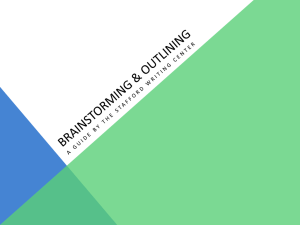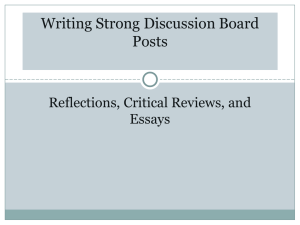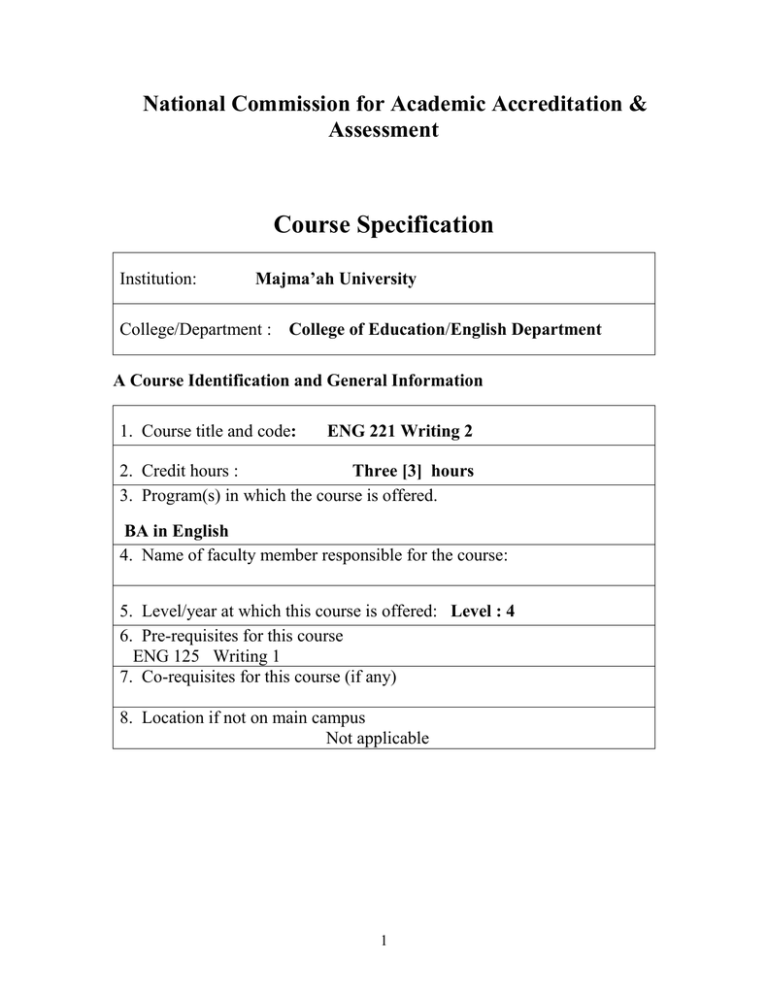
National Commission for Academic Accreditation &
Assessment
Course Specification
Institution:
Majma’ah University
College/Department : College of Education/English Department
A Course Identification and General Information
1. Course title and code:
ENG 221 Writing 2
2. Credit hours :
Three [3] hours
3. Program(s) in which the course is offered.
BA in English
4. Name of faculty member responsible for the course:
5. Level/year at which this course is offered: Level : 4
6. Pre-requisites for this course
ENG 125 Writing 1
7. Co-requisites for this course (if any)
8. Location if not on main campus
Not applicable
1
B Objectives
1. Developing key writing skills needed in academic courses at higher
levels so as to achieve greater communicative effectiveness. This
includes summarization, drawing information from a variety of sources
and using the library.
2. Focusing on the elements of successful written communication: for
example, the skills of revision, editing, and proof-reading skills; and the
skills required to organize sentences and paragraphs into logical
sequence.
3. Developing the students' paragraph writing skills to short essay, of three
to five paragraphs, writing skills.
4. Enabling the students to write in various genres in the appropriate styles
(free-writing, descriptions, narratives, comparisons, cause and effect,
argumentation - for and against etc).
5. Training the students on different steps of writing short essays –
stimulating ideas, brainstorming, making outline, making the first draft
expanding the outline by adding details, descriptions, examples,
comparisons, data, arguments and so on ; and proof reading and editing
6. Revising different language structures and grammatical items needed
2. Briefly describe any plans for developing and improving the course that
are being implemented.
Information and communication technology to be used for visual writing
C. Course Description
This course aims at developing the students' paragraph writing skills to short
essay, of three to five paragraphs, writing skills preparing them for future
writing activities in academic writing like writing "term papers" and short
"research papers"; and in professional life writing like preparing "CVs",
"case reports" and so on.
After a quick review of "paragraph writing" activities, the course moves on
to the definition and qualities of a good essay comparing its different parts
with those of a paragraph: the topic-the topic, the topic sentenceintroductory paragraph, supporting sentences-body paragraphs and
concluding sentence – concluding paragraph. The students are introduced
with the different steps of essay writing – stimulating ideas, brainstorming
and outlining, developing ideas, making the first draft and finally editing.
2
The students then move on to writing short essays (guided, semi-guided and
free) to express their views on different topics. The course focuses on
writing "descriptive essays, narrative essays, opinion essays, comparison
essays and cause and effect essays.
Special consideration will be paid to the processes of gathering information
(data), organizing and analyzing it so as to provide the informal, initial
background for more serious research (academic) writing at higher levels.
1 Topics to be Covered
List of Topics
No of
Weeks
Contacth
ours
2
6
2
6
2
6
2
6
2
6
2
6
2
6
1
3
Orientation
Revision: paragraph, its different parts and paragraph writing
Paragraph to Short Essay: comparing a paragraph to a short essay;
unity and coherence of sentences within a paragraph; unity and
coherence of paragraphs in an essay; discussing "Simple, Compound
and Run-on Sentences"; and editing activities
Writing Descriptive Essays: stimulating ideas; brainstorming and
outlining; first draft – prepositional phrases in descriptive writing,
adjectives in descriptive writing, formation of adjectives and order
of adjectives; and editing
Writing Narrative Essays: stimulating ideas; brainstorming and
outlining; first draft- showing sequence in Narrative Essays, using
time adverbs and use of subordinating conjunctions, use of Past
Continuous Tense, Past Time clauses, Simultaneous and Interrupted
activities; editing. 1st Mid-term
Writing Opinion Essays: stimulating ideas; brainstorming and
outlining; first draft – facts and opinions, interpreting facts to
support an opinion, arguments and counter arguments; using
quantity expressions in Opinion Essays, connectors to show support
and opposition; editing
Writing Comparison and Contrast Essays: stimulating ideas;
brainstorming and outlining; first draft – comparison and contrast
connectors, using comparatives; editing
Writing Cause and Effect Essays: stimulating ideas; brainstorming
and outlining-cause and effect organization; first draft – casual
chains, the future with "will", "will" with "so that", expressing future
possibility with "If" clauses
3
2 Course components (total contact hours per semester):
Lecture:
30 hrs.
Tutorial:
Laboratory
2 hours
Practical Writing
Other:
15 hours
3. Additional private study/learning hours expected for students per week.
Continuous writing habit to develop their skills- one hour
a. Knowledge
(i) Description of the knowledge to be acquired
The students will be able to use mind mapping and graphic organizer to
connect and generate ideas for free writing of ideas and feelings through
effective written communication
(ii) Teaching strategies to be used to develop that knowledge
Socialized Discussion with the aid of information and communication
technologylike power point presentations of lectures.
Brainstorming
Writing exercises
(iii) Methods of assessment of knowledge acquired
Oral recitation / Class participation/ Individual oral presentation
Skill based guide/ graded communicative activities
Formative assessment
Use of checklist and rubrics for evaluation
Examinations
4
Writing portfolio
b. Cognitive Skills
(i) Description of cognitive skills to be developed
The students will be able to enrich their vocabulary skills thru writing their
personal opinions, anecdotes and experiences with the assistance of varied
references like information technology system. Books and journals.
(ii) Teaching strategies to be used to develop these cognitive skills
Socialized Discussion with the aid of information and communication
technology like power point presentations of lecture.
Interactive Class discussion – question and answer
Experiential Writing / Journal writing
(iii) Methods of assessment of students cognitive skills
Oral recitation / Class participation/ Writing Portfolio
Skill based guide/ graded communicative activities
Formative assessment
Use of checklist and rubrics for evaluation
Examinations
c. Interpersonal Skills and Responsibility
(i) Description of the interpersonal skills and capacity to carry
responsibility to be developed
The students will be able to develop their writing skills through peer
coach writing.
5
Peer editing
Peer checking is a tool that will help them to proof read their writings
before editing.
(ii) Teaching strategies to be used to develop these skills and abilities
Socialized Discussion with the aid of information and communication
technology like power point presentations of lecture.
Interactive Class discussion – question and answer
Experiential Writing- active, hands-on concrete experience is the most
powerful and natural form of learning. Students should be immersed in
the most direct possible experiences of the content of every subject.
Collaborative- cooperative learning activities .
(iii) Methods of assessment of students interpersonal skills and capacity
to carry responsibility
•
Individual Writing Tasks
•
Skill based guide/ graded writing activities
•
Use of checklist and multi trait rubrics for evaluation
•
Feedback/ problem based learning
•
Formative assessment
d. Communication, Information Technology and Numerical Skills
(i) Description of the skills to be developed in this domain.
The students will be able to develop writing skills through searching for and
exposing themselves to different writing styles, formats and contents in
information communication technology.
(ii) Teaching strategies to be used to develop these skills
6
Socialized Discussion with the aid of information and communication
technology like power point presentations of lecture.
Interactive Class discussion – question and answer
Experiential Writing- active, hands-on concrete experience is the
most powerfuland natural form of learning. Students should be
immersed in the most directpossible experiences of the content of
every subject.
(iii) Methods of assessment of students numerical and communication
skills
o Individual Writing Tasks
o Skill based guided/ graded communicative activities
o Use of checklist and holistic rubrics for evaluation
o Feedback/ problem based learning
e. Psychomotor Skills (if applicable)
(i) Description of the psychomotor skills to be developed and the level of
performance required
Tofreely express their feelings and thoughts in their rhetorical writing.
(ii) Teaching strategies to be used to develop these skills
Writing exercises
Personal Journal
(iii) Methods of assessment of students psychomotor skills
o Individual Writing Tasks
o Skill based guided/ graded communicative activities
7
o Use of checklist and multi trait rubrics for evaluation
o Feedback/ problem based learning
o Formative assessment
5. Schedule of Assessment Tasks for Students During the Semester
Assessment
Assessment task (eg. essay, test,
group project, examination etc.)
Week
Due
Proportion
of Final
Assessment
Midterm Examination 1
6th week
10 th
week
1st -15th
weeks
17th week
15 %
1
2
3
4
Midterm Examination 2
Writing Porfolio, assignments and
participation
Final Examination
TOTAL
15%
10%
60 %
100 %
D. Student Support
1. Arrangements for availability of teaching staff for individual student
consultations and academic advice.
•
•
electronic mail support
academic advisory by appointment
E Learning Resources
1. Required Text(s)
Effective Academic Writing 2 [ The Short Essay]
Alice Savage and Patricia Mayer
Oxford University Press 2005
ISBN: 13: 978-0-19-430923-3
8
2. Essential References
Ready to Write 3 [From Paragraph to Essay]
Karen Blanchard and Christine Root
Pearson Longman Education Inc. 2010
ISBN: 13 978 0 13 136334 2
3- Recommended Books and Reference Material
(Journals, Reports, etc) (Attach List)
Interactions Writing 2.
Cheryl Pavlik. Margaret Keenan Segal.
McGraw Hill Education United Kingdom. 2009.
4-.Electronic Materials, Web Sites etc
www.creativewriting.com
www.freewriting.com
5- Other learning material such as computer-based programs/CD,
professional standards/regulations
F. Facilities Required
Indicate requirements for the course including size of classrooms and
laboratories (ie number of seats in classrooms and laboratories, extent of
computer access etc.)
1. Accommodation (Lecture rooms, laboratories, etc.)
28 students in 120 square meters room
2. Computing resources
not applicable
3. Other resources (specify --eg. If specific laboratory equipment is required, list
requirements or attach list)
G Course Evaluation and Improvement Processes
9
1 Strategies for Obtaining Student Feedback on Effectiveness of
Teaching
Students’ evaluation
Module descriptor evaluation questionnaires
2 Other Strategies for Evaluation of Teaching by the Instructor or by
the Department
Peer evaluation
Department head evaluation and feedback
Colleagues support
3 Processes for Improvement of Teaching
Continuous studying by attending refreshing courses in graduate
school
To attend the seminars and conferences.
To continue to do research studies.
To read and learn the latest trend in education to enhance teaching
skills
4. Processes for Verifying Standards of Student Achievement
Colleagues support
5 Describe the planning arrangements for periodically reviewing
course effectiveness and planning for improvement.
Seeking students’ opinion on course
Surfing the internet for new developments
Periodical staff meetings for course evaluation
10


